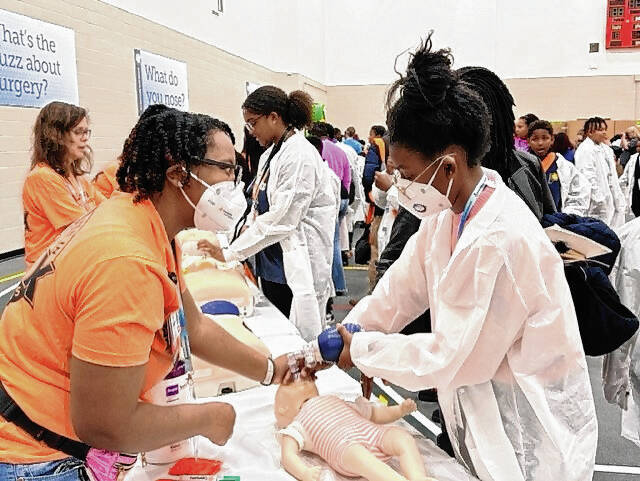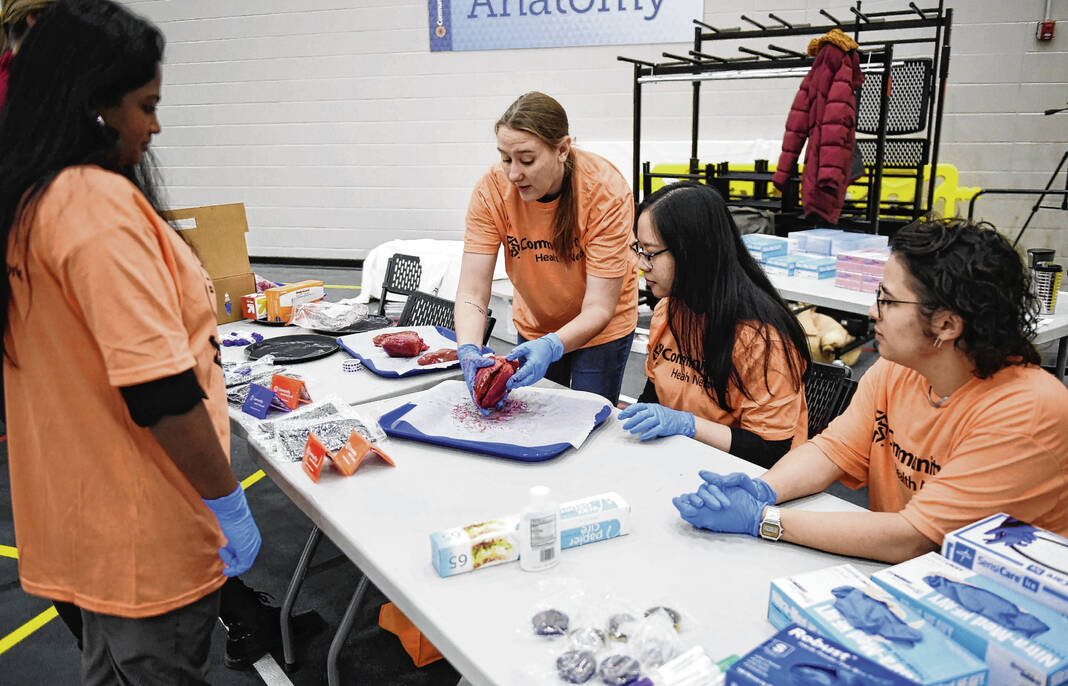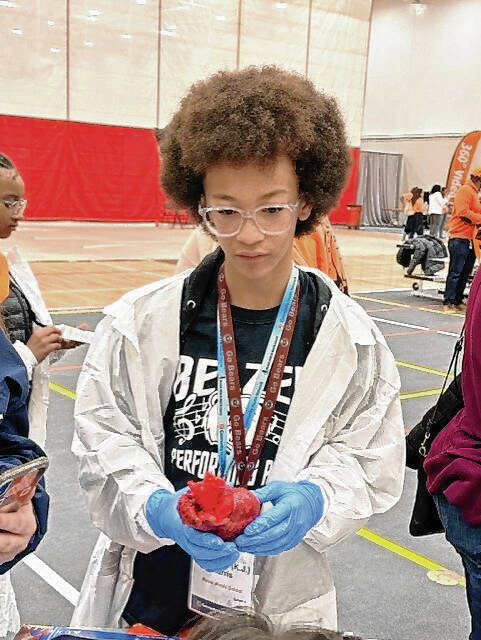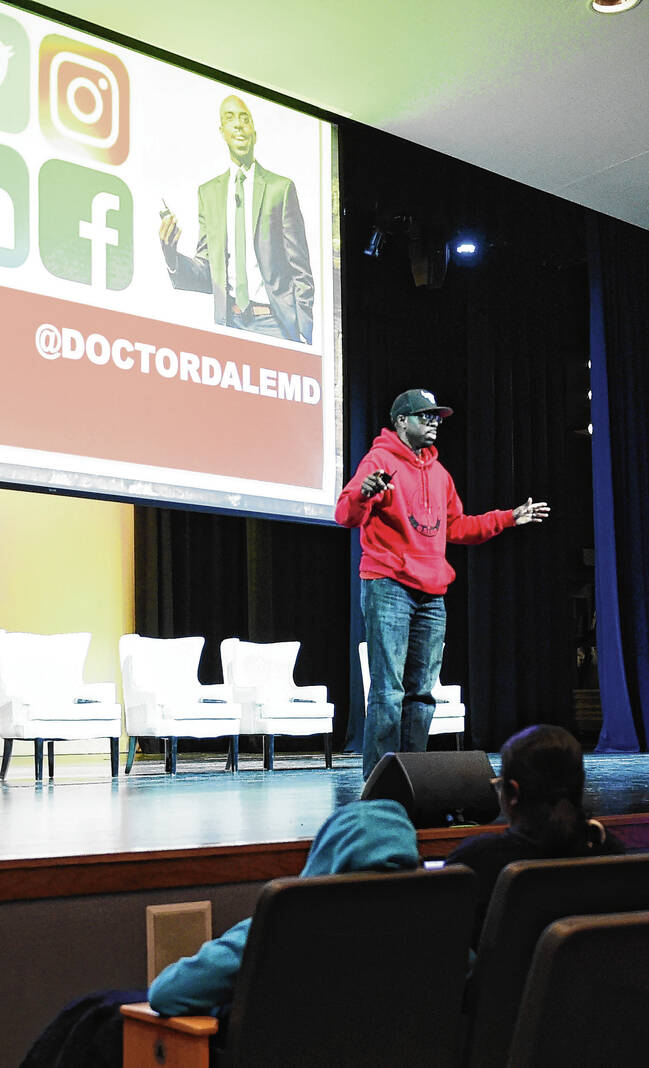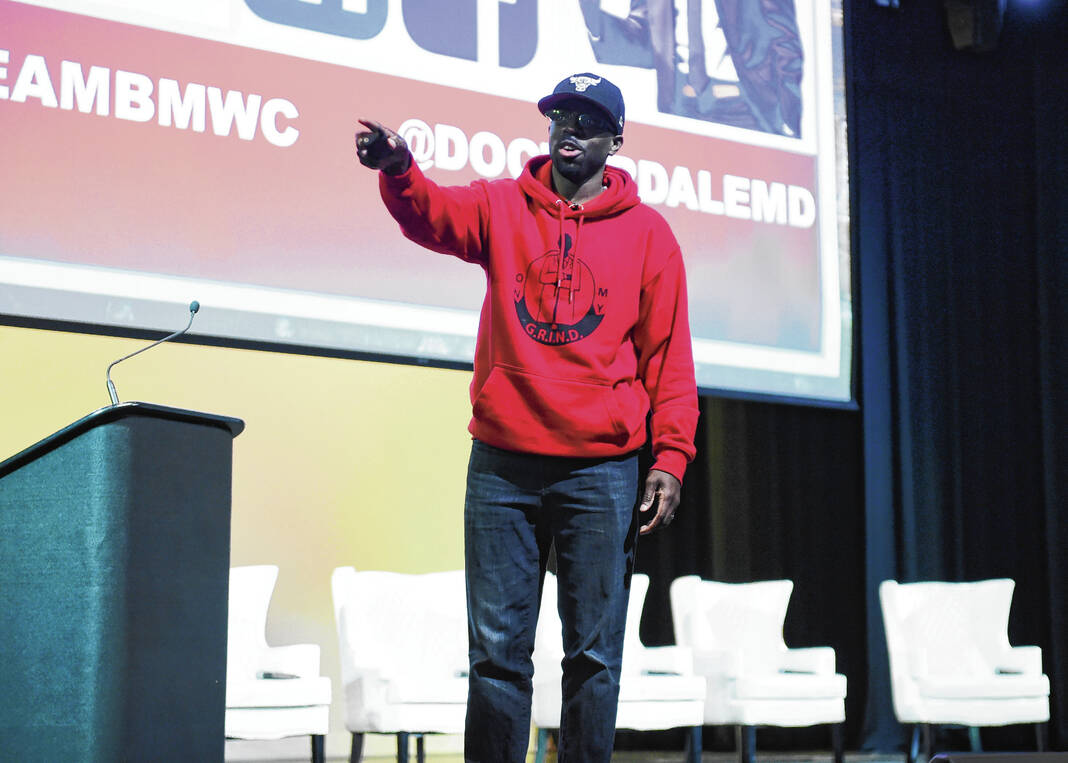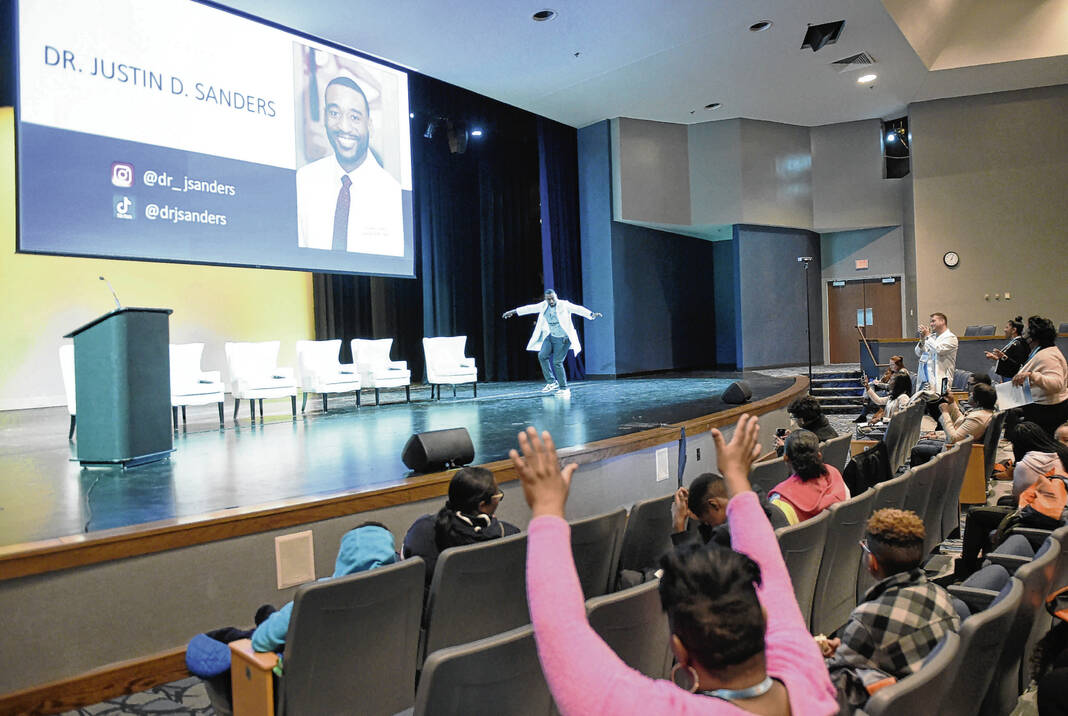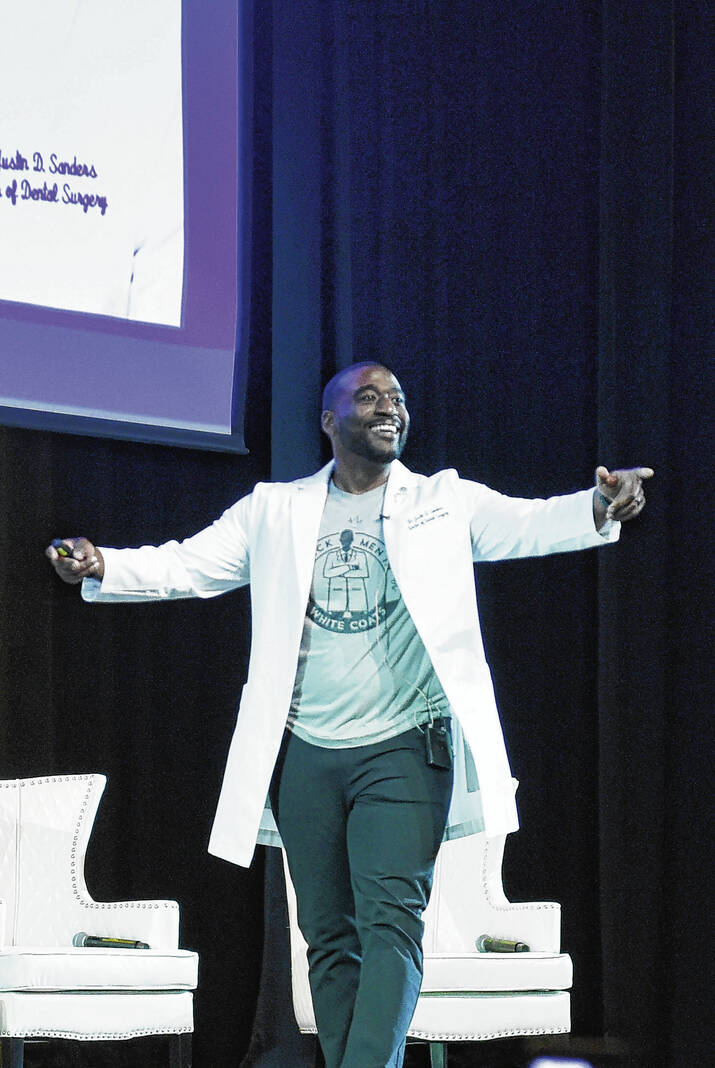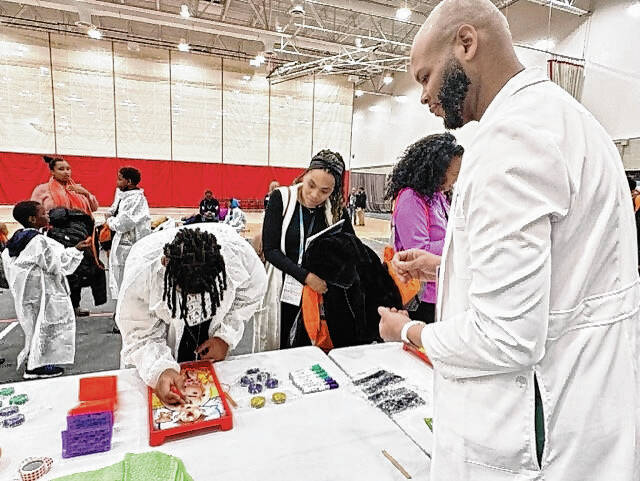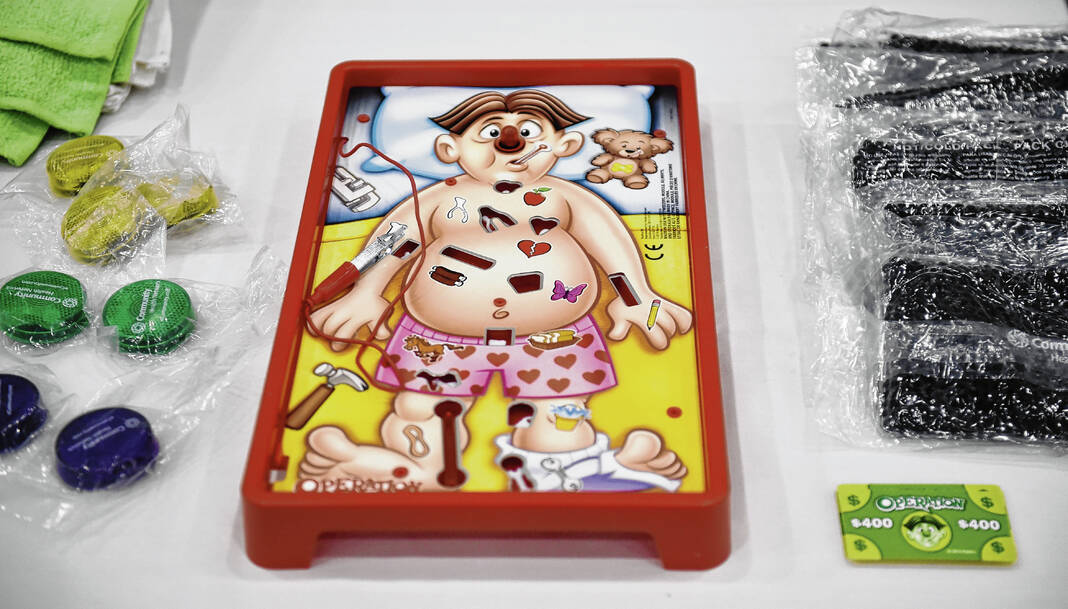Upbeat dance music filled the auditorium as Black families from all over central Indiana filtered in and took their seats.
Hundreds of kids of all ages had come with their parents to Lawrence North High School in Indianapolis to explore their options in the field of health care.
They all had similar ambitions, drives and goals. And over the course of an action-packed day, they heard the same message from doctors who look just like them — you can do this.
“I want to be a doctor so I can help adults. I want to wear that white coat,” said Nygill Brown, 7, of Indianapolis, who had come to the event with his mother.
Community Health Network hosted Indiana’s inaugural youth summit for the Black Men In White Coats program on Nov. 12, welcoming about 600 students in grades 3 to 12 as well as parents, educators and community leaders to learn about careers in health care.
They heard about the days in the life of a cardiologist, a family medicine physician and surgeon. Participants could try CPR on a training dummy, learn about ambulances and other types of medical vehicles and see actual hearts and other organs.
Organizers hoped that the event will be one step toward increasing the number of Black men and women in health care and medicine.
“While we can implore our health care system to employ a higher number of Black physicians, we need a pipeline of people to get into the system of health care education,” said Dr. Anthony Sanders, a Black obstetrician-gynecologist with Community Health Network in Indianapolis. “A lot of times it’s very difficult to see that as an option when all you see are people who do not look like you in that position.”
Black Men In White Coats was founded in 2013, following an alarming report by the Association of American Medical Colleges. The report found that the number of Black male applicants to medical school, which was already low, was decreasing. Dr. Dale Okorodudu, an award-winning physician, speaker and best-selling author, took action.
He reached out to medical schools, high schools and physicians to form a group providing inspiration and mentorship to young people — both boys and girls — who may be interested in healthcare as a profession.
The issue is one that remains troubling. The percentage of Black doctors nationwide is 5.3% of all practicing physicians. The 2020 Census estimated that Black people make up 14.2% of the total population.
In Indiana, Black doctors are 4.8% of the total practicing physician population.
“There is a large population of people who are underrepresented tragically in the health care field. That population is the Black population,” Sanders said. “There has been plenty of research studies to show when Black patients are able to see Black physicians, their health care outcomes increase significantly.”
Though the work takes many forms, the most visible outlet is through youth summits held in cities around the country.
Youth summits have been held in major cities across the country, though this is the first one held in Indiana. Community Health Network is the only healthcare system to sponsor the event.
“The mission of Black Men in White Coats to increase the number of Black men in the field of medicine aligns with Community’s commitment to diversity, equity, and inclusion in our own workforce, “said Diane McDaniel, Community Health Network chief diversity, equity, and inclusion officer. “We look at this as an opportunity to inspire a future generation of healthcare providers and, by doing so, ensuring we are providing care for all who need it.”
Throughout the day during the Nov. 12 youth summit, students took part in hands-on activities and networked with healthcare professionals from diverse backgrounds.
“We talked about wanting to be a doctor, getting him an early start and giving him an education. His mom works in health care, so I wanted to give him some new opportunity and insight on things,” said Delicia Stephens, Nygill’s mother. “I figured it’s a great event because he can see other people just like him.”
Participants took part in sessions such as “A Day in the Life of Surgery” and “A Day in the Life of Family Medicine.” The goal was to inspire and show them that there are people who look like them in this field, and that a career in medicine is possible.
“When our youth look at who are acceptable Black people, we see them in entertainment, we see them in sports, but we don’t always get Black people highlighted in fields like health care,” Sanders said. “We want to show that they have options, and health care is one of them.”
Certain sessions, such as “How to Raise a Doctor,” were aimed at helping teach parents how to encourage and support their children who want to go into medicine.
“Maybe their kids have expressed interest in health care but they don’t know what the first steps are in order to get their child to go down that pathway,” Sanders said.
Speakers included physicians, pharmacists, dentists and mental-health specialists, with keynote speaker Kevin Cosby, president of Simmons College of Kentucky, Louisville’s only historically Black college.
The event’s master of ceremonies was Dr. Justin Sanders, an Indianapolis native who now practices in Charlotte, North Carolina, and is known on social media as “the Dancing Dentist.” He shared his story, stressing how important it was to have mentors who looked like him.
“The moral of the story is, all things are possible, if you put in the work and follow your dreams,” Justin Sanders said.
Okorodudu attended the summit and brought an infectious energy to the stage as he addressed the kids who dreamed of being a doctor like him.
His focus was teaching them the secret to success is the G.R.I.N.D. — goals, reason, information, network and discipline. He compared those gathered in the auditorium to eagles, who could soar as long as they’re in the right position.
“As long as you’re in the right environment, up high, around the right type of people — other eagles who want to fly high in the sky — you can and you will be successful,” Okorodudu said.


